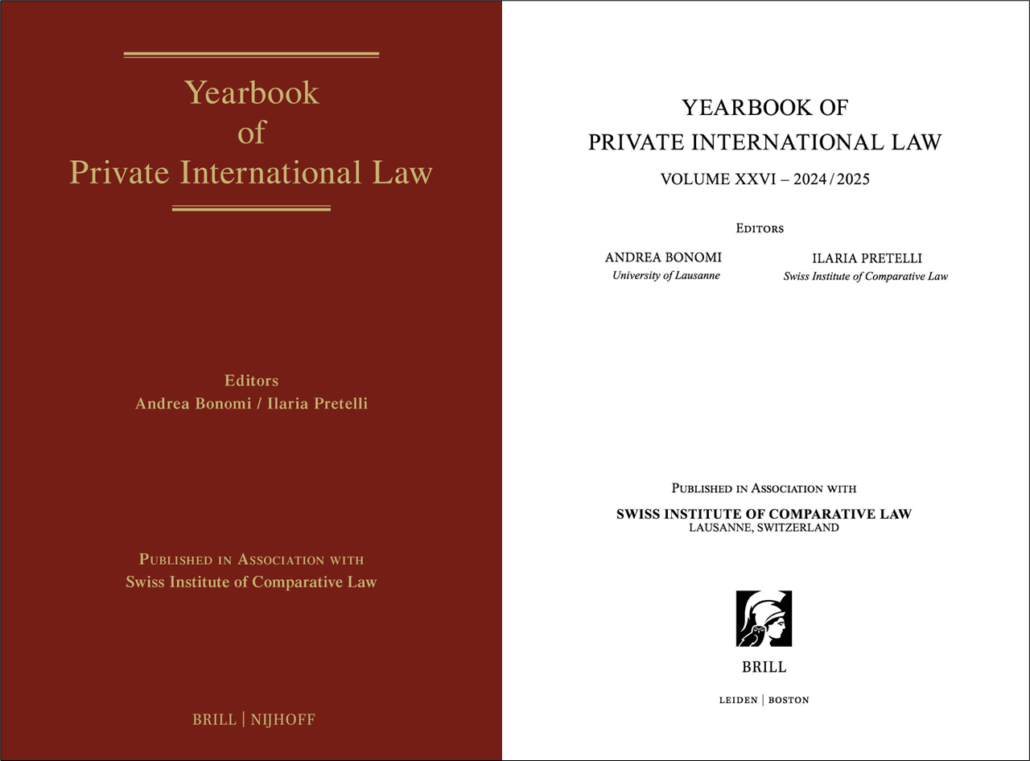Tag Archive for: choice of court agreements
HCCH Monthly Update: July 2025
/in News/by HCCHConventions & Instruments
On 1 July 2025:
- The 2019 Judgments Convention entered into force for the United Kingdom. At present, 33 HCCH Members are either bound by the 2019 Judgments Convention or a Contracting Party for which the Convention has not entered into force yet (Albania, Andorra, and Montenegro). More information is available here.
- The 1996 Child Protection Convention entered into force for El Salvador. The Convention currently has 57 Contracting Parties. More information is available here.
- The 2007 Child Support Convention entered into force for Colombia. At present, 55 States and the European Union are bound by the 2007 Child Support Convention. More information is available here.
- The 2005 Choice of Court Convention entered into force for Bahrain. At present, 37 States and the European Union are bound by the 2005 Choice of Court Convention. More information is available here.
On 5 July 2025, the 1970 Evidence Convention entered into force for the Philippines. The Convention currently has 69 Contracting Parties. More information is available here.
On 24 July 2025, the Republic of Moldova acceded to the 1970 Evidence Convention. The Convention currently has 69 Contracting Parties. More information is available here.
Publications
On 22 July 2025, the Permanent Bureau announced the publication of the fifth editions of the Practical Handbooks on the Operation of the 1965 Service and 1970 Evidence Conventions. Incorporating recent developments, court decisions, and practical examples provided by experts from around the world, as well as updates from the meeting of the Special Commission held in July 2024, the fifth editions of the Handbooks are essential resources for anyone involved in the implementation and operation of the 1965 Service and 1970 Evidence Conventions. More information is available here.
Meetings & Events
On 10 July 2025, the Permanent Bureau of the HCCH and the Asian Business Law Institute co-hosted the webinar “Cross-border Commercial Dispute Resolution – Electronic Service of Documents and Remote Taking of Evidence”. More information is available here.
On 11 July 2025, the first meeting of the Working Group dedicated to the Model Forms for Chapter II of the 1970 Evidence Convention was held online, hosted by the Permanent Bureau. More information is available here.
Other Developments
On 9 July 2025, the premises of the HCCH’s Regional Office for Africa, hosted by the Kingdom of Morocco, were officially opened in Rabat. More information is available here.
On 10 July 2025, the Permanent Bureau of the HCCH announced several developments with regard to the HCCH’s International Child Abduction Database (INCADAT), including the launch of its new notification service. More information is available here.
These monthly updates are published by the Permanent Bureau of the Hague Conference on Private International Law (HCCH), providing an overview of the latest developments. More information and materials are available on the HCCH website.
Who is bound by Choice of Court Agreements in Bills of Lading?
/in Views/by Mukarrum AhmedAccording to the doctrine of privity of contract, only parties to a choice of court agreement are subject to the rights and obligations arising from it. However, there are exceptions to the privity doctrine where a third party may be bound by or derive benefit from a choice of court agreement, even if it did not expressly agree to the clause. A choice of court agreement in a bill of lading which is agreed by the carrier and shipper and transferred to a consignee, or third-party holder is a ubiquitous example. Read more
Bahraini High Court on Choice of Court and Choice of Law Agreements
/4 Comments/in Views/by Béligh ElbaltiI. Introduction
It is widely recognized that choice of court and choice of law agreements are powerful tools for structuring and planning international dispute resolution. These agreements play an important role in “increasing legal certainty for the parties in cross-border transactions and reducing incentives for (the harmful version of) forum shopping.” (Alex Mills, Party Autonomy in Private International Law (CUP, 2018) p. 75). However, the realization of these objectives depends on the enforcement of the parties’ choice. Unfortunately, general practice in the MENA (North Africa and the Middle East) region shows that, with a few exceptions, the status quo is far from satisfactory. Choice-of-court agreements conferring jurisdiction on foreign courts are often disregarded or declared null and void. Similarly, the foreign law chosen as the governing law of a contract is often not applied because of the procedural status of foreign law as a matter of fact, the content of which must be ascertained by the party invoking its application. The recent judgment of the High Court of Bahrain (a first instance court in the Bahraini judicial system) in the Case No. 2/13276/2023/02 of 17 January 2024 is nothing but another example of this entrenched practice that can be observed in the vast majority of countries in the region.
Implied Jurisdiction Agreements in International Commercial Contracts
/in Views/by Chukwuma OkoliAuthors: Abubakri Yekini (Lecturer in Conflict of Laws at the University of Manchester) and Chukwuma Okoli (Assistant Professor in Commercial Conflict of Laws at the University of Birmingham, Senior Research Associate at the University of Johannesburg).
A Introduction
In an increasingly globalised economy, commercial transactions often involve business entities from different countries. These cross-border transactions present complex legal questions, such as the place where potential disputes will be adjudicated. To provide certainty, commercial parties often conclude ex ante agreements on the venue for dispute resolution by selecting the court(s) of a particular state. However, what happens if no such express agreement over venue is reached for resolving a contractual dispute? Could consent to the venue be implicitly inferred from the parties’ conduct or other factors?

